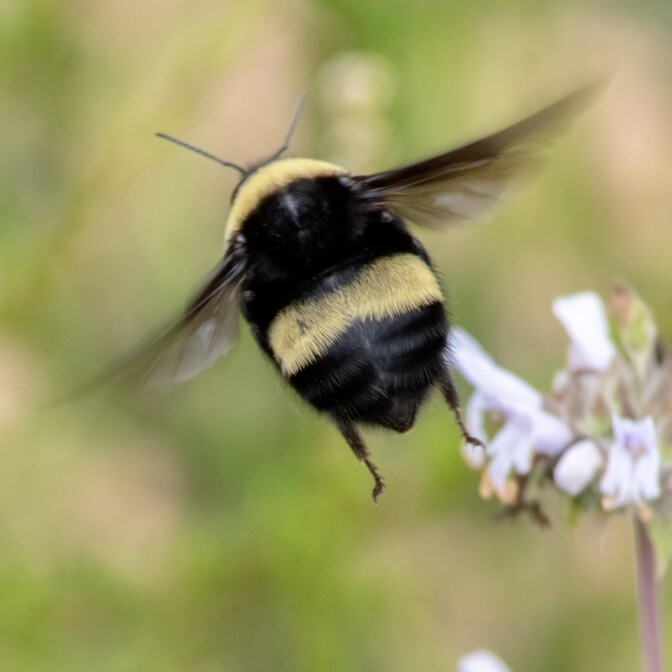This story is free to read because readers choose to support LAist. If you find value in independent local reporting, make a donation to power our newsroom today.
Could a bumblebee derail a decades old housing project? Advocates say there's a chance

A state-protected bumblebee is at the center of a luxury housing project in the Verdugo Mountains after Fish and Wildlife officials announced last week that it will conduct another environmental impact report.
The agency is now asking for public input on the supplemental report until Sept. 2.
The Canyon Hills project is a 221-unit luxury home development planned for the hillside above the 210 Freeway in Sunland-Tujunga. In 2005, the L.A. City Council approved an initial environmental impact report for the project from the developer, Whitebird Inc.
No Canyon Hills — a local environmental group — has been asking for a new report to fully review the Canyon Hills project’s effects on the area.
“I feel really grateful for CDFW for doing the right thing because it’s not easy to do the right thing,” said Emma Kemp, the group’s co-founder.
Why does this new report matter?
No Canyon Hills submitted evidence to California Department of Fish and Wildlife in 2023 showing that the Bombus Crotchii, or Crotch’s bumblebee, and other protected species like mountain lions have been spotted within the project site.
On Aug. 1, the department notified No Canyon Hills that the agency will be conducting a draft SEIR before possibly granting an Incidental Take Permit to Whitebird Inc. California’s Environmental Quality Act requires this type of permit from developers to “take” a California Endangered Species Act listed species during the project process.
The caveat: the report will focus only on how the project would affect the Crotch’s bumblebee, a native pollinator that’s currently a candidate for listing as endangered or threatened by the state, meaning that the bumblebee is granted full protections for now.
“These poor little bees have been affected by habitat loss, fragmentation, and climate change," said Tiffany Yap, a senior scientist for the Center for Biological Diversity. "They have a very narrow climate that they are accustomed to."

Yap said the bumblebee plays a vital role in pollinating fire resistant plants, such as sage and wild buckwheat, in wildfire prone areas. The bug also pollinates milkweed, a plant crucial to saving the monarch butterflies.
What are the other concerns?
“There’s also the presence of at least two mountain lions which we’ve shown are active on the project site,” said Kemp. “Their presence needs to be addressed by CDFW.”
Kemp has submitted evidence to the city of L.A. and to CDFW of multiple sightings of a male and female mountain lions passing separately through the project site area.
Southern California mountain lions are also a candidate species for the CESA. Habitat loss, human encroachment, highways are just some of the many factors that’s led to the decline of the mountain lions.
Adding to that, the project site stands in a very high fire severity zone.
What does the developer say?
In a statement to LAist, Jack Ruben the attorney for Whitebird Inc. said the company was aware that Fish and Wildlife has started to prepare for the SEIR and that “it looks forward to CDFW's issuance of that permit at the conclusion of the process.”
Could this end the project indefinitely?
Not necessarily.
Doug Carstens, an attorney working with No Canyon Hills, said that even if the SEIR finds negative impacts to the bumblebee, CDFW could still issue the ITP in what’s called a statement of overriding considerations.
“That is a statement that requires various findings, including that they’ve adopted every feasible mitigation measure and they’ve reduced impacts as much as possible,” Carstens said. “That there are no alternatives that are environmentally superior.”
Carstens said this concession is typically granted when benefits of the project outweigh the project’s adverse effects on the environment. The group is urging the public to provide input in the drafted report process.
“With this particular case of Canyon Hills, that will be extremely difficult to suggest that there is a benefit to building a luxury private development in a wildfire prone hillside, that outweighs the consequence of destroying vital habitat for an endangered and protected species,” Kemp said.
HOW TO SUBMIT PUBLIC COMMENT
You can submit a comment to CDFW ahead of the draft SEIR by 5 p.m. Sept. 2.
To submit by mail:
California Department of Fish and Wildlife
ATTN: Canyon Hills ITP – NOP Scoping Comments
3883 Ruffin Road
San Diego, CA 92123
To submit by email:
R5CEQA@wildlife.ca.gov
The subject line should read “Canyon Hills ITP – NOP Scoping Comments”. Learn more here.
What’s the timeline on this?
Carstens points out that the SEIR process could take months, or even a year. That timeline is close to when Whitebird Inc.’s contract with the city is set to expire in October 2026.
L.A. City Councilmember Monica Rodriguez, whose district covers the Verdugo Mountains, told LAist in a statement that the project was entitled through its agreement to begin construction until 2026.
“Anything beyond that would require a discretionary action for an extension, which I am not supportive of,” Rodriguez said.











